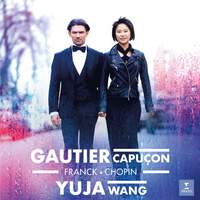Recording of the Week,
Franck and Chopin from Gautier Capuçon and Yuja Wang
As the nights really start to draw in and the weather grows more wintry, at least for our readers in the Northern Hemisphere, it’s nice to have something warming to keep the spirits up on the final straight towards Christmas. This week’s Recording of the Week should do the trick – two full-bloodedly Romantic cello sonatas from Gautier Capuçon and Yuja Wang, with an Argentine chaser as encore.
 César Franck’s Cello Sonata, with its inverted arrangement of movements beginning and ending with relatively slow material, is a quintessential poster-child for the school of French lyricism that flourished in the late nineteenth century. Originally written for the violin as a wedding-present for his friend Ysaÿe, but adapted with the composer’s permission for cello, it’s infused with a fundamental warmth and optimism. The opening chords seem to slip in through a half-open door, and for the first eight bars or so one has the sense of Wang playing with ideas before inviting Capuçon to join in. This sense of subtlety, of give and take between the two instruments, sets the tone for the whole album.
César Franck’s Cello Sonata, with its inverted arrangement of movements beginning and ending with relatively slow material, is a quintessential poster-child for the school of French lyricism that flourished in the late nineteenth century. Originally written for the violin as a wedding-present for his friend Ysaÿe, but adapted with the composer’s permission for cello, it’s infused with a fundamental warmth and optimism. The opening chords seem to slip in through a half-open door, and for the first eight bars or so one has the sense of Wang playing with ideas before inviting Capuçon to join in. This sense of subtlety, of give and take between the two instruments, sets the tone for the whole album.
The scherzo entails a never-ending flurry of notes for Wang, who opens the movement with a solo statement of its main theme that never sounds anywhere near as technically difficult as it truly is – testament to her cast-iron technique. It’s often said of Romantic sonatas like these that the pianist is doing very much more than “accompanying”; this is indubitably the case here, and indeed in places almost the reverse; at several points Capuçon keeps his rapid passagework right down in the background so that Wang’s moto perpetuo semiquavers can come to the fore. The recitative sees Capuçon shift seamlessly into solo-suite mode and back, and Wang take on the role of a continuo-player providing unobtrusive harmonic scaffolding for the melody, and the final allegretto is a perfect illustration of Franck’s ability to make middling tempi sound every bit as engaging as an impassioned largo or furious presto. In the second half Capuçon opens up into a yearning style closer to what one might expect of a concerto, though never allowing himself to lose sight of the earnest simplicity of that main motif that makes the movement so effective.
 Chopin’s G minor Cello Sonata was composed at a low point in the composer’s personal life and its turbulence is reflected in the players’ approach from the very beginning, with Capuçon’s cello instantly taking on a different, more volatile, persona compared to the Franck. The harmony never quite sits still, and both players respond instinctively to the music’s sense of insecurity and angst. Even Capuçon’s tone itself seems somehow more on edge, less relaxed than before. The scherzo is almost Mahlerian in its sense of suppressed neurotic anxiety bubbling away beneath the surface, though Wang occasionally coaxes Capuçon into movements of lyrical relaxation. It’s in the largo that Wang’s mastery of the piano moves from merely ‘impressive’ into ‘borderline magical’; the muted, pearly sound she produces is so striking that it’s hard not to assume that she must have changed to a different instrument for this movement.
Chopin’s G minor Cello Sonata was composed at a low point in the composer’s personal life and its turbulence is reflected in the players’ approach from the very beginning, with Capuçon’s cello instantly taking on a different, more volatile, persona compared to the Franck. The harmony never quite sits still, and both players respond instinctively to the music’s sense of insecurity and angst. Even Capuçon’s tone itself seems somehow more on edge, less relaxed than before. The scherzo is almost Mahlerian in its sense of suppressed neurotic anxiety bubbling away beneath the surface, though Wang occasionally coaxes Capuçon into movements of lyrical relaxation. It’s in the largo that Wang’s mastery of the piano moves from merely ‘impressive’ into ‘borderline magical’; the muted, pearly sound she produces is so striking that it’s hard not to assume that she must have changed to a different instrument for this movement.
The ‘chaser’ I referred to earlier is Piazzolla’s Le Grand Tango, which Capuçon and Wang lend a spacious, at times almost majestic feel – Piazzolla’s nuevo tango works were very much conceived as ‘art’ music, intended to be taken seriously, and this ten-minute fantasia-like piece is a fine ambassador for his style. Capuçon in particular adapts his sound to the idiom, with some particularly biting downbows that he doesn’t use elsewhere on this recording, but mercifully it’s very far from being an exoticised, over-spiced rendition.
The two sonatas are such staples of the repertoire that, inevitably, plenty of recordings already exist, some by extremely illustrious musicians. For me, though, there’s something about this one that gets fully into the psychological world of each work in a way I haven’t really heard before. The contrast is palpable between Franck, penning a wedding gift for a friend, and Chopin, emerging from the wreckage of a disastrous love affair. This is a recording I can see myself listening to over and over again to capture new nuances in the performances.
Gautier Capuçon (cello), Yuja Wang (piano)
Available Formats: CD, MP3, FLAC, Hi-Res FLAC, Hi-Res+ FLAC



